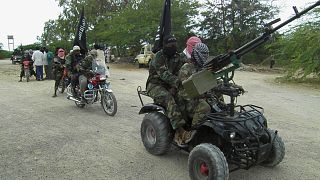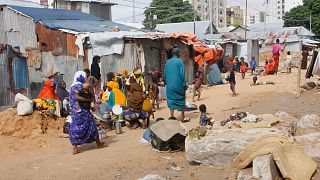Somalia
With long queues reported at some polling stations, voters as young as 15 in the self-declared republic of Somaliland cast their ballots on Monday in the capital Hargeisa.
In the elections -- voters were tasked with choosing from nearly 250 candidates running for 82 parliamentary seats, and about 1,000 contesting 249 councillor posts.
This is the first time national and local elections were held together and with more than one million citizens registered to participate in the parliamentary and council polls -- which were both long overdue,
President Muse Bihi Abdi and the leaders of Somaliland's two opposition parties called for an orderly vote as they cast their ballots in the capital Hargeisa.
"Somaliland votes for peace. It is an honour for our people (and) the Horn of Africa at large," Muse posted on his official Twitter account.
Voting was reportedly conducted in a peaceful and inclusive manner -- demonstrating the capacity for peaceful democratic elections in this internationally non-recognised country that declared independence from Somalia 30 years ago.
Osman Ahmed Abdi, a voter appeared excited.
"I cast my vote in this polling station, Insha Allah, I’m very happy to cast my vote."
Sheikh Ali Ahmed Dhimbil, another voter, was feeling patriotic.
"This parliamentary election that is happening today is a great step forward for Somaliland, with this election, we want recognition from the world and help to find our seat in the United Nations."
"This election was very competitive, and the turnout is amazing," said Dahir Ahmed, a police officer guarding a polling station in Hargeisa.
"People started getting in line before daybreak, enthusiastically waiting to cast their votes. Security is tight... We're looking forward to a peaceful end of voting."
Elections for the president are held separately in Somaliland and not due until the five-year term of President Musa Bihi Abdi expires in late 2022.
Somaliland's orderly election and universal franchise stand in stark contrast to Somalia, which is barely held together by a weak central government in Mogadishu, and has not held a one-person, one-vote poll in 50 years.
Mogadishu and the leaders of Somalia's five semi-autonomous states this month agreed to hold long-overdue elections within 60 days, after a prior timetable collapsed because of violence.
The promised vote is indirect, like in past elections, with special delegates chosen by clan leaders who pick lawmakers, who in turn choose the president.
Somalia fiercely opposes Somaliland's claims to independence and considers the region part of its territory, though in reality Mogadishu exercises little authority over its affairs.
Boasting a long coastline on the Gulf of Aden and a vast desert interior, Somaliland has a functioning government and institutions, its own currency, passport and armed forces.
But its quest for recognised statehood remains largely unrealised, despite the political stability and democratic governance it enjoys, setting it apart from some of its neighbours.













01:21
Cameroon 2025: Maurice Kamto seeks to vie on a different political outlook
01:52
Togo’s security forces cast early votes ahead of high-stakes municipal elections
Go to video
Togo suspends French state-owned broadcasters RFI and France 24
Go to video
Protesters gather in Ivory Coast, demand Thiam's return on electoral list
02:13
Cameroon: Police, opposition supporters clash as election looms
01:25
Burundi awaits results of local and parliamentary elections